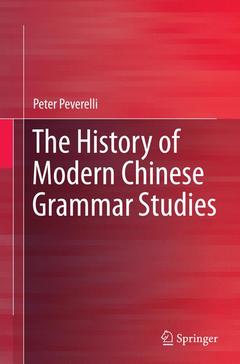Description
The History of Modern Chinese Grammar Studies, 2015
Author: Peverelli Peter
Language: English
Subject for The History of Modern Chinese Grammar Studies:
Approximative price 94.94 €
In Print (Delivery period: 15 days).
Add to cartPublication date: 10-2016
Support: Print on demand
Approximative price 94.94 €
In Print (Delivery period: 15 days).
Add to cartPublication date: 04-2015
204 p. · 15.5x23.5 cm · Hardback
Description
/li>Contents
/li>Comment
/li>
This book discusses the way Chinese scholars developed a national grammar. Chinese didn?t develop grammar until China?s contact with Western grammar books in the 19th Century. The first indigenous grammar was published in 1889. It included some traditional notions, but mainly imitated European grammar. It was followed by a number of other similar works. To move away from this imitation, a group of grammarians started to look into the Chinese tradition of commenting on classics. This led to a variety of alternative grammars. After the war, Western linguistics started to gain influence in China. With the establishment of the PRC in 1949, efforts began to have a standard grammar adopted nationwide. The first attempt at such a grammar was published in 1956. This book spans the period 1898 ? 1956.This book combines historiography and linguistics to distinguish different periods in the timespan covered. It shows how the development of a national grammar cannot be studied separately from language policies and discussions on the national language. The description of each period includes a general introduction of the relevant events in that period and a treatment of the major works of grammar.
A must-have for all university libraries, since there is no other book on this topic in a Western language
Highlights how China adopted and adapted an aspect of Western thought that has been previously ignored: it will appeal to researchers in a number of fields of Chinese studies
Adds to our understanding of the definition of a national language and the socio-political consequence of different definitions, making the book appealing to scholars
Includes supplementary material: sn.pub/extras




